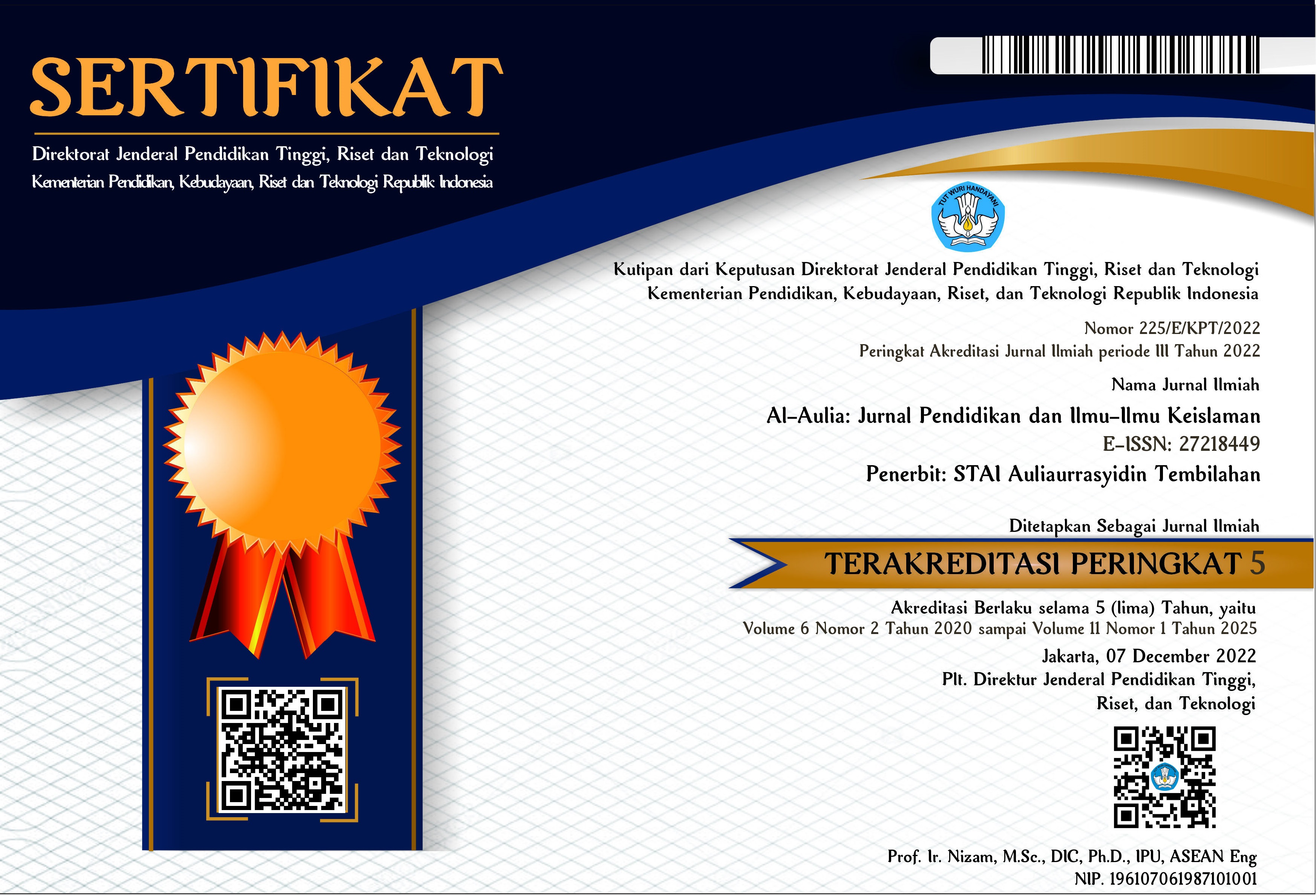Analisis Pengembangan Kurikulum Pendidikan di Madrasah Aliyah Negeri Insan Cendikia Serpong Jakarta
DOI:
https://doi.org/10.46963/aulia.v10i1.2066Keywords:
Curriculum, Development, MadrasahAbstract
The development of educational curricula at Islamic educational institutions greatly determines the quality of these institutions. This research aims to analyze and describe the development of the educational curriculum at Madrasah Aliyah Negeri Insan Cendikia Serpong Jakarta. This research method uses a descriptive qualitative approach, while data collection techniques in this research use observation, interviews and documentation, with data analysis techniques using data reduction, data presentation and drawing conclusions. The results of this research show that MAN Insan Scholar Serpong (MAN IC Serpong) is a model of secondary education unit that integrates Islamic Religious Education with science and technology in a balanced manner. This approach aims to be a pioneer in overcoming the divide between religious knowledge and science and technology. The advantages of MAN IC Serpong can be seen in curriculum development, Information and Communication Technology (ICT) based management, learning facilities, professionally managed dormitories, and daily communication using Indonesian and international languages.
References
Adichie, C. N. (2014). We Should All Be Feminists. Germany : Anchor Books.
Asia Society. 2020. Educating for Global Competence : Preparing Our Youth to Engage the World. New York : The Asia Society.
Banks, J. A. (2015). Cultural Diversity and Education: Foundations, Curriculum, and Teaching. London : Routledge.
Betts, A., & Collier, P. (2017). Refuge: Transforming a Broken Refugee System. London : Allen Lane.
Bruner, J. (2016). Toward a Theory of Instruction. United States : Belknap Press.
Collins. A., & Halverson. R. 2018. Rethinking Education in the Age of Technology: The Digital Revolution and Schooling in America. New York: Teachers College Press.
Booth, A., Papaioannou, D., & Sutton, A. (2012). Systematic Approaches to a Successful Literature Review. Sage Publications
Darling-Hammond, L. (2017). Empowered Educators: How High-Performing Systems Shape Teaching Quality Around the World. San Francisco : Jossey-Bass.
Dillenbourg, P. (1999). What Do You Mean by Collaborative Learning?. In P. Dillenbourg (Ed.), Collaborative-learning: Cognitive and Computational Approaches. (pp.1-19). Oxford: Elsevier
Fadel, C. (2022). Four-Dimensional Education: The Competencies Learners Need to Succeed. California : CreateSpace Independent Publishing Platform.
Fullan, M. (2020). The Devil Is in the Details: System Solutions for Equity, Excellence, and Student Well-being. California : Corwin.
Galtung, J. (2017). Peace by Peaceful Means: Peace and Conflict, Development and Civilization. California : SAGE Publications Ltd
Gay, G. (2018). Culturally Responsive Teaching: Theory, Research, and Practice. New York : Teachers College Press.
Giddens, A. (2018). The Consequences of Modernity. California : Stanford University Press.
Gilmer, G. (2018). Teaching in the Elementary School: A Reflective Action Approach. Cengage Learning. London : Pearson.
G. V. Ramanathan, 2022. Leadership for Global Systemic Change: Beyond Ethics and Social Responsibility. Procedia Economics and Finance.49 – 59
Hehir, T. (2005). New Directions in Special Education: Eliminating Ableism in Policy and Practice. United States : Harvard Education Press.
Irawan Soehartono, Metode Penelitian Sosial, Suatu Teknik Penelitian Bidang Kesejahteraan Sosial dan Ilmu Sosial Lainnya (Bandung: Remaja Rosdakarya, 2019).
Jackson. A. 2021. Global Education in Practice: Teaching, Learning, and Leadership. Bulgarian : Comparative Education Society
Jacobs, H. H. (2004). Getting Results with Curriculum Mapping. Virginia, USA : ASCD.
Jhon W. Creswell, Educational Research, Planing, Conducting, and Evaluating Quantitative and Qualitative Research (Boston: University of Nebraska- Lincoln, 2018).
Johnson, D. W., & Johnson, R. T. (2014). Cooperative learning in the classroom. Interaction Book Company. United States : Association for Supervision and Curriculum Development (ASCD)
Downloads
Published
Issue
Section
License
Copyright (c) 2024 Ardiansyah Ardiansyah, Mukhtar Latif, Kaspul Anwar Us

This work is licensed under a Creative Commons Attribution-ShareAlike 4.0 International License.
Authors who publish with this journal agree to the following terms:
1. Copyright on any article is retained by the author(s).
2. The author grants the journal, right of first publication with the work simultaneously licensed under a Creative Commons Attribution License that allows others to share the work with an acknowledgment of the work’s authorship and initial publication in this journal.
3. Authors are able to enter into separate, additional contractual arrangements for the non-exclusive distribution of the journal’s published version of the work (e.g., post it to an institutional repository or publish it in a book), with an acknowledgment of its initial publication in this journal.
4. Authors are permitted and encouraged to post their work online (e.g., in institutional repositories or on their website) prior to and during the submission process, as it can lead to productive exchanges, as well as earlier and greater citation of published work.
5. The article and any associated published material is distributed under the Creative Commons Attribution-ShareAlike 4.0 International License







